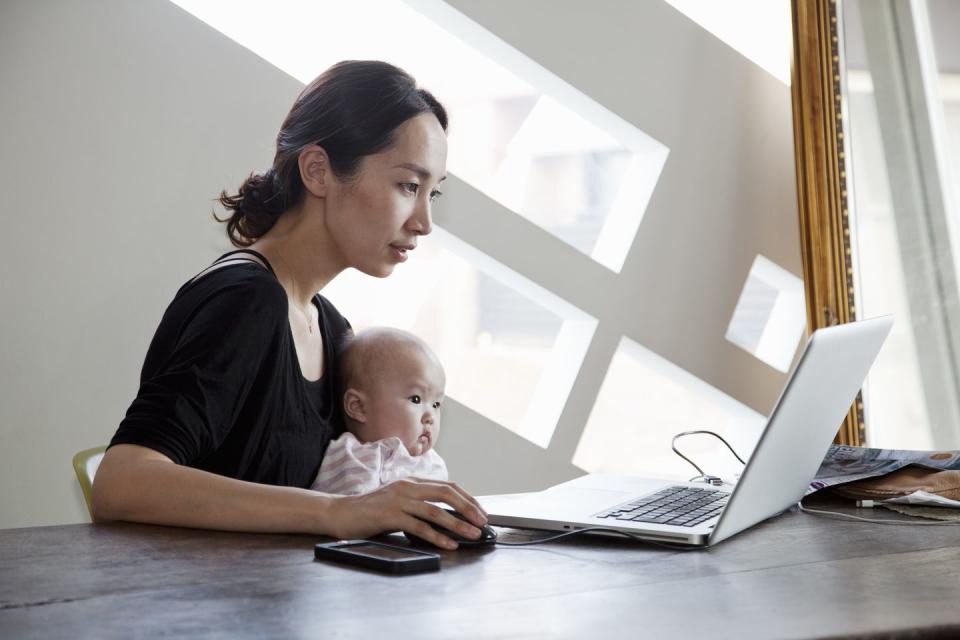The UK Is In A Recession, So How Does This Affect Women?

Earlier this month it was announced that the UK was officially in a recession following a steady decline in the economy. Between July and September last year, the Gross Domestic Product (GDP) saw a 0.1% contraction, and unexpectedly fell further by 0.3% from October to December.
While the country was in an economic decline for the majority of last year, for the UK to be considered to be in a recession, it requires two successive quarters of financial decrease, which is where it currently stands (as of Thursday last week).
The news of a recession won't be a surprise to some amid an ongoing cot of living crisis with exceedingly high inflation rates, which have forced many households to make drastic cut-backs on spending to save money.
FIND OUT MORE ON ELLE COLLECTIVE
Against the backdrop of the British election this year, Prime Minister Rishi Sunak's failing promise to grow the economy appears to have fallen on deaf ears.
Liberal Democrats leader Sir Ed Davey recently stated that the recession will result in 'hardworking Brits picking up the tab through high food prices, tax hikes and skyrocketing mortgage bills'. Davey also said that continuing economic decline has 'left families to cope with spiralling prices', and will undoubtedly leave other marginalised groups, such as ethnic minorities and women, suffering.
However, Ruth Gregory, an analyst at the Capital Economics has described this current recession as 'mild as they come' and that 'timely indicators suggest it is already nearing an end'. Several leading experts concur with Gregory, noting that inflation has eased up in recent months, yet wages remain unaligned with rising prices.
Unsurprisingly, many of us are unsure what the future holds for our finances and livelihoods, especially given the not-too-distant realities of how detrimental the economic decline was during the COVID-19 pandemic which continue to affect the world to this day.

As a result, we spoke to a range of financial experts to find out how the recession will affect women and what we can do to mitigate its consequences.
How did the COVID-19 recession affect women?
The UK was last in a recession during the COVID-19 pandemic, which began in 2020. While the pandemic might seem like a distant memory, the financial disparities among men and women during the economic downturn have not been forgotten.
During the pandemic, it was reported that women were 8 timesmore likely to have lost their job or quit work as opposed to men. Mothers in particular were hit hardest, according to a study by the Institute of Fiscal Studies, which found that they were 47% more likely to lose their jobs as compared to fathers.
The health crisis widened existing gender inequalities in the UK and global workforce for two reasons, according to Selina Flavius, the founder of financial coaching company Black Girl Finance. 'During the pandemic female dominated sectors, like retail and hospitality, were shut down. At the same time, women took on many of the caring responsibilities if they were able to continue to work. This combination forced many out of the workforce,' she tells ELLE UK.
In 2021, the House of Lords Library reported that 46% of mothers who had been made redundant during the pandemic cited a lack of childcare as the leading cause. Meanwhile, a staggering 70% of women with caring responsibilities, who requested furlough following school closures in 2021, found their requests to be denied.

How will the 2024 recession affect women?
According to Emilie Bellet, the founder and CEO of Vestpod (a digital platform and community that empowers women financially through education, workshops and events), skill gaps and systemic barriers are still an issue despite the lessening severity of Covid-19.
'The ongoing cost-of-living crisis worsens this situation, highlighting the urgent need for more support and proactive financial planning,' Bellet says. 'Pay gaps, especially for women of colour and mothers, make saving difficult and debt handling even tougher.'
Given the inequalities women face, as stated by Bellet, a YouGov survey of 2,001 Britons found that over 36% of women would be unable to afford everyday costs if another recession was to occur, in comparison to 26% of men, according to the FT.
'Since the pandemic there has been an increase in women taking advantage of hybrid and remote working, I'm not worried that we will see what happened during Covid happen again just yet,' Flavius notes. 'Although, that is not to say that issues facing women in the workplace, such as lack of affordable child care and gender pay gaps, have been resolved.'
The Government has been taking steps to confront these issues, albeit slowly. As of April this year the government will be doubling the amount of free childcare available for working parents, and by September 2025, working parents of children under the age of five will be entitled to30 hours free childcare per week.
The news comes after the Government launched an inquiry looking into the impact of the rising cost of living on women in September 2023, and is investigating how costs will intensify existing disparities and how the Government, stakeholders and different sectors of the economy should mitigate circumstances.
Taking practical steps to aid women this time around and ease their financial burdens are incremental, but as Flavius suggests: 'There is still a lot to do.'
ELLE Collective is a new community of fashion, beauty and culture lovers. For access to exclusive content, events, inspiring advice from our Editors and industry experts, as well the opportunity to meet designers, thought-leaders and stylists, become a member today HERE
You Might Also Like

